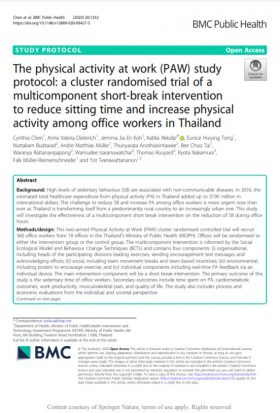This website uses cookies so that we can provide you with the best user experience possible. Cookie information is stored in your browser and performs functions such as recognising you when you return to our website and helping our team to understand which sections of the website you find most interesting and useful.
The physical activity at work (PAW) study protocol: a cluster randomised trial of a multicomponent short-break intervention to reduce sitting time and increase physical activity among office workers in Thailand

รายละเอียดเพิ่มเติม
Abstract
Background: High levels of sedentary behaviour (SB) are associated with non-communicable diseases. In 2016, the estimated total healthcare expenditure from physical activity (PA) in Thailand added up to $190 million in international dollars. The challenge to reduce SB and increase PA among office workers is more urgent now than ever as Thailand is transforming itself from a predominantly rural country to an increasingly urban one. This study will investigate the effectiveness of a multicomponent short break intervention on the reduction of SB during office hours.
Methods/design: This two-armed Physical Activity at Work (PAW) cluster randomised controlled trial will recruit 360 office workers from 18 offices in the Thailand’s Ministry of Public Health (MOPH). Offices will be randomised to either the intervention group or the control group. The multicomponent intervention is informed by the Social Ecological Model and Behaviour Change Techniques (BCTs) and contains four components: (i) organisational, including heads of the participating divisions leading exercises, sending encouragement text messages and acknowledging efforts; (ii) social, including team movement breaks and team-based incentives; (iii) environmental, including posters to encourage exercise; and (iv) individual components including real-time PA feedback via an individual device. The main intervention component will be a short break intervention. The primary outcome of this study is the sedentary time of office workers. Secondary outcomes include time spent on PA, cardiometabolic outcomes, work productivity, musculoskeletal pain, and quality of life. The study also includes process and economic evaluations from the individual and societal perspective.
Discussion: The study will be the first experimental study in Thailand to investigate the effect of a short-break intervention at the workplace on SBs of office workers and health outcomes. The study will also include a costeffectiveness analysis to inform investments on short break interventions under the Universal Healthcare Coverage in Thailand, which includes health promotion and disease prevention component.




